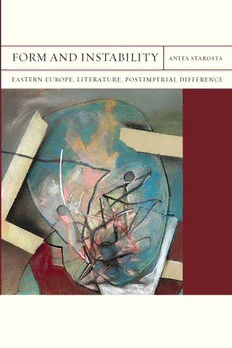
Form and Instability: Eastern Europe, Literature, Postimperial Difference PDF
Preview Form and Instability: Eastern Europe, Literature, Postimperial Difference
Form and Instability 8 flashpoints The FlashPoints series is devoted to books that consider literature beyond strictly national and disciplinary frameworks, and that are distinguished both by their historical grounding and by their theoretical and conceptual strength. Our books engage theory without losing touch with history and work historically without falling into uncritical positivism. FlashPoints aims for a broad audience within the humanities and the social sciences concerned with moments of cultural emergence and transformation. In a Benjaminian mode, FlashPoints is interested in how literature contributes to forming new constellations of culture and history and in how such formations function critically and politically in the present. Series titles are available online at http://escholarship.org/uc/flashpoints. series editors: Ali Behdad (Comparative Literature and English, UCLA), Founding Editor; Judith Butler (Rhetoric and Comparative Literature, UC Berkeley), Founding Editor; Michelle Clayton (Hispanic Studies and Comparative Literature, Brown University); Edward Dimendberg (Film and Media Studies, Visual Studies, and European Languages and Studies, UC Irvine), Coordinator; Catherine Gallagher (English, UC Berkeley), Founding Editor; Nouri Gana (Comparative Literature and Near Eastern Languages and Cultures, UCLA); Susan Gillman (Literature, UC Santa Cruz); Jody Greene (Literature, UC Santa Cruz); Richard Terdiman (Literature, UC Santa Cruz) A complete list of titles is on page 222. Form and Instability Eastern Europe, Literature, Postimperial Difference Anita Starosta northwestern university press ❘ evanston, illinois this book is made possible by a collaborative grant from the andrew w. mellon foundation. Northwestern University Press www.nupress.northwestern.edu Copyright © 2016 by Northwestern University Press. Published 2016. All rights reserved. Digital Printing isbn 978-0-8101-3202-3 paper isbn 978-0-8101-3259-7 cloth Library of Congress Cataloging-in-Publication data are available from the Library of Congress. The paper used in this publication meets the minimum requirements of the American National Standard for Information Sciences—Permanence of Paper for Printed Library Materials, ansi z39.4811992. Ojcu, zamiast pożegnania Contents Acknowledgments ix Introduction 3 part one Frames of Intelligibility 1. The Passing of Eastern Europe: Area Studies and Rhetoric 23 2. Strategies of Accession: Europe and Deixis 47 part two Conditions of Legibility 3. The Right Accent: Europe, Irony, and Conrad’s Long Silences 75 4. Countries of Degraded Form: Reading Gombrowicz 101 5. Europe after Eurocentrism: Translating Tischner’s Góral Philosophy 138 Conclusion 163 Notes 167 Bibliography 199 Index 217 Acknowledgments How do you start at the beginning, if things happen before they happen? clarice lispector, The Hour of the Star To acknowledge others’ help and inspiration is also to locate origins. Here, I am obliged to name only the most direct, the ones I can be sure of. And so this book owes much to Wlad Godzich, who seems to have always already been there. In her seminar “Transfigurations,” Teresa de Lauretis first taught me to connect translation and figuration and more than once pointed me in the right direction. James Clifford’s teaching has had a gradual and long-acting influence as I have come to recognize in his work what I may have learned from him, without realizing it, in the first place: the value of instability, open-endedness. Gina Dent and Neferti Tadiar showed me how to seek out difficulty in the silence that happens when incongruous discourses and objects are made to confront one another—to take stammering as a sign of mean- ingfulness yet to be found. All of this built on the work of my previ- ous teachers: María Antonia Garcés and David Grossvogel, along with the late Don Fredericksen and Dick Neisser, at Cornell; and Andrzej Dąbrowski and Ewa Radziwinowicz still earlier. I’ve been privileged to be part of two intellectual communities that have sustained much of my work since graduate school. One of these is the editorial collective of the journal boundary 2, where Paul Bové’s generosity and friendship, and frequent conversations with scholars including Aamir Mufti, R. A. Judy, Hortense Spillers, Nancy Condee, Manisha Basu, Nergis Ertürk, Ruth Hung, and Rich Purcell have made it a home. The other community consists of Neda Atanasoski, Kalindi
